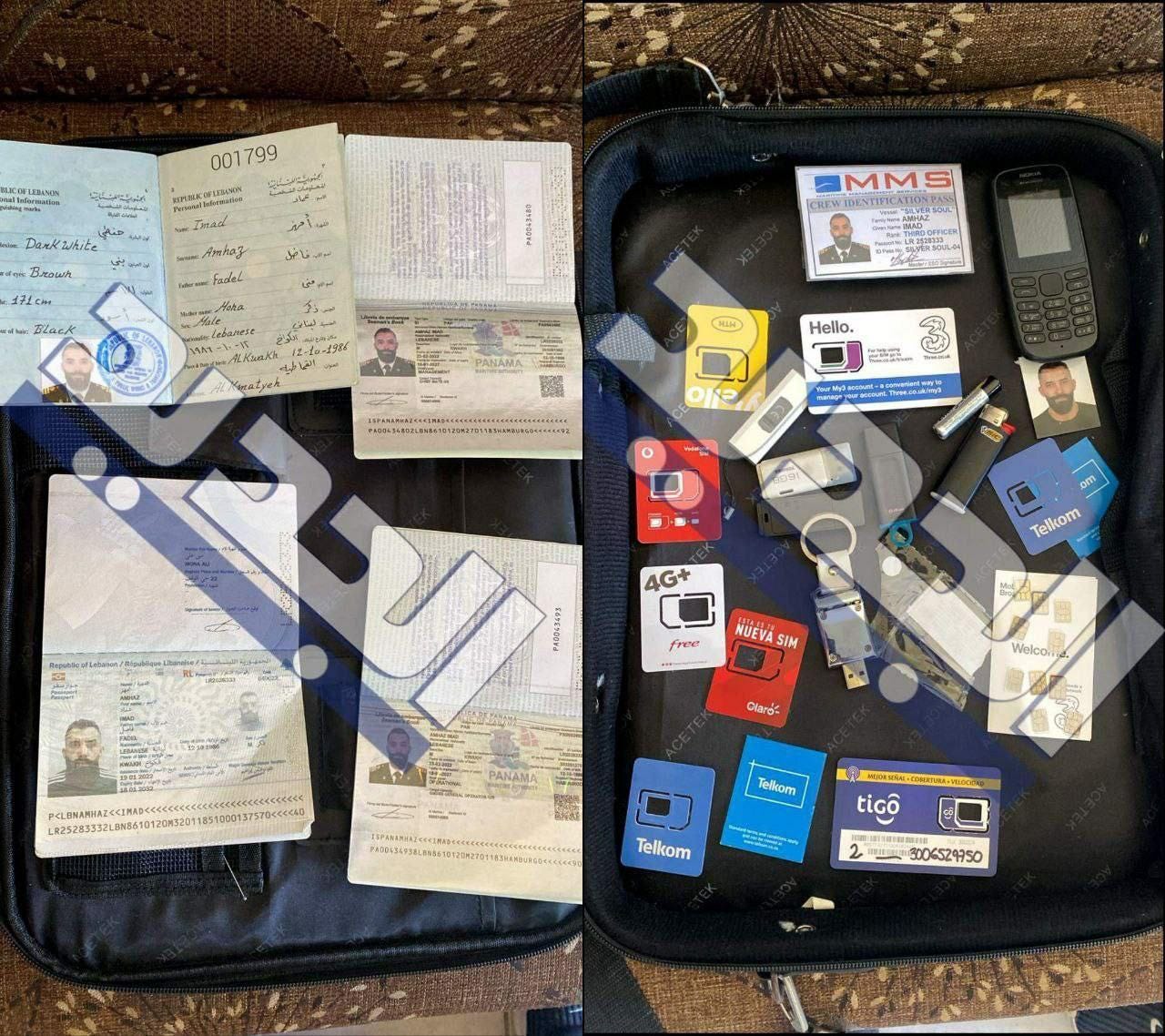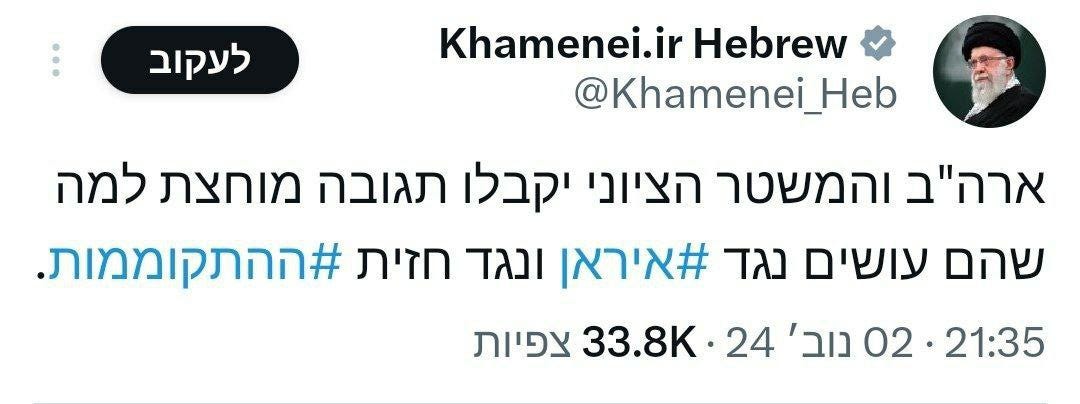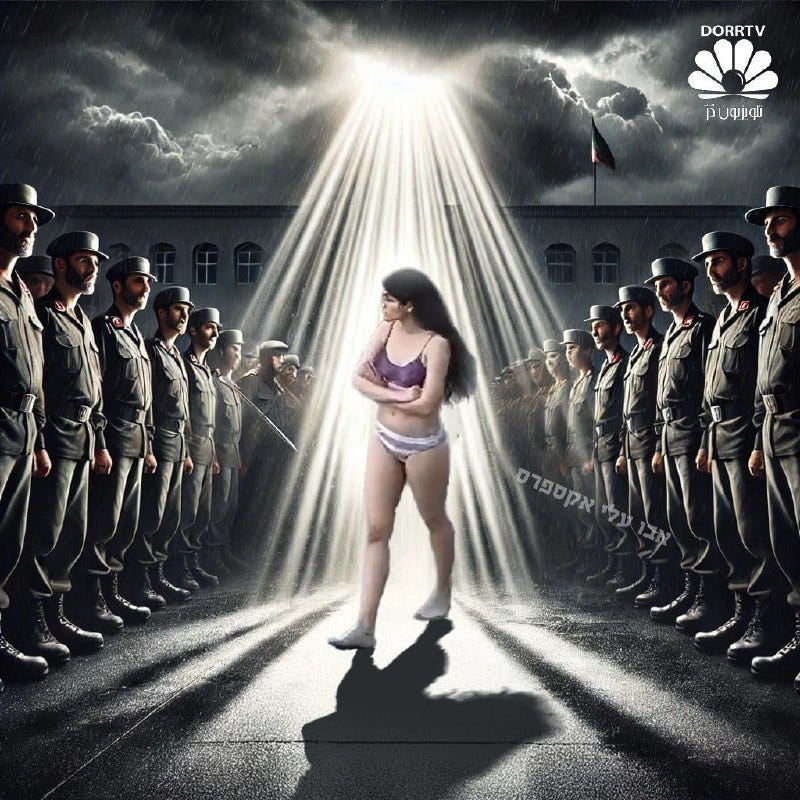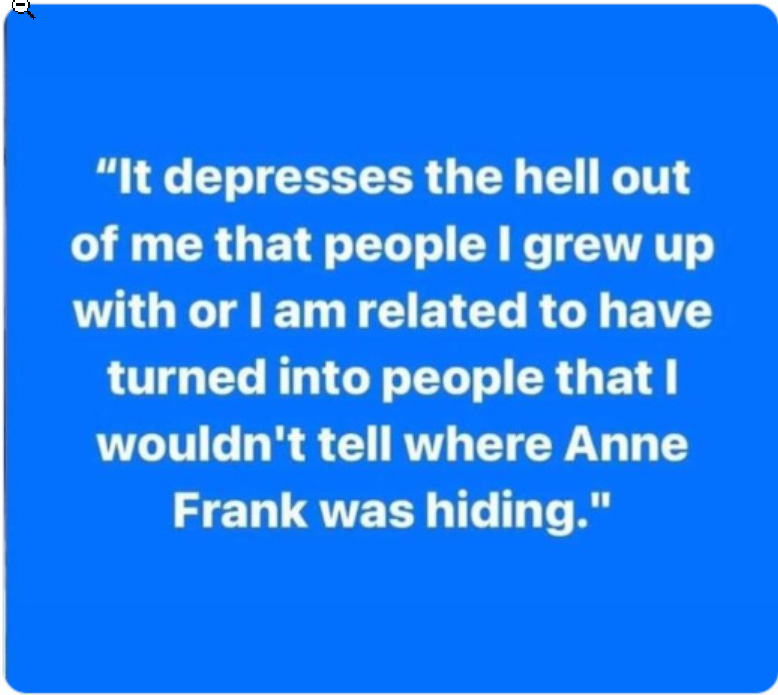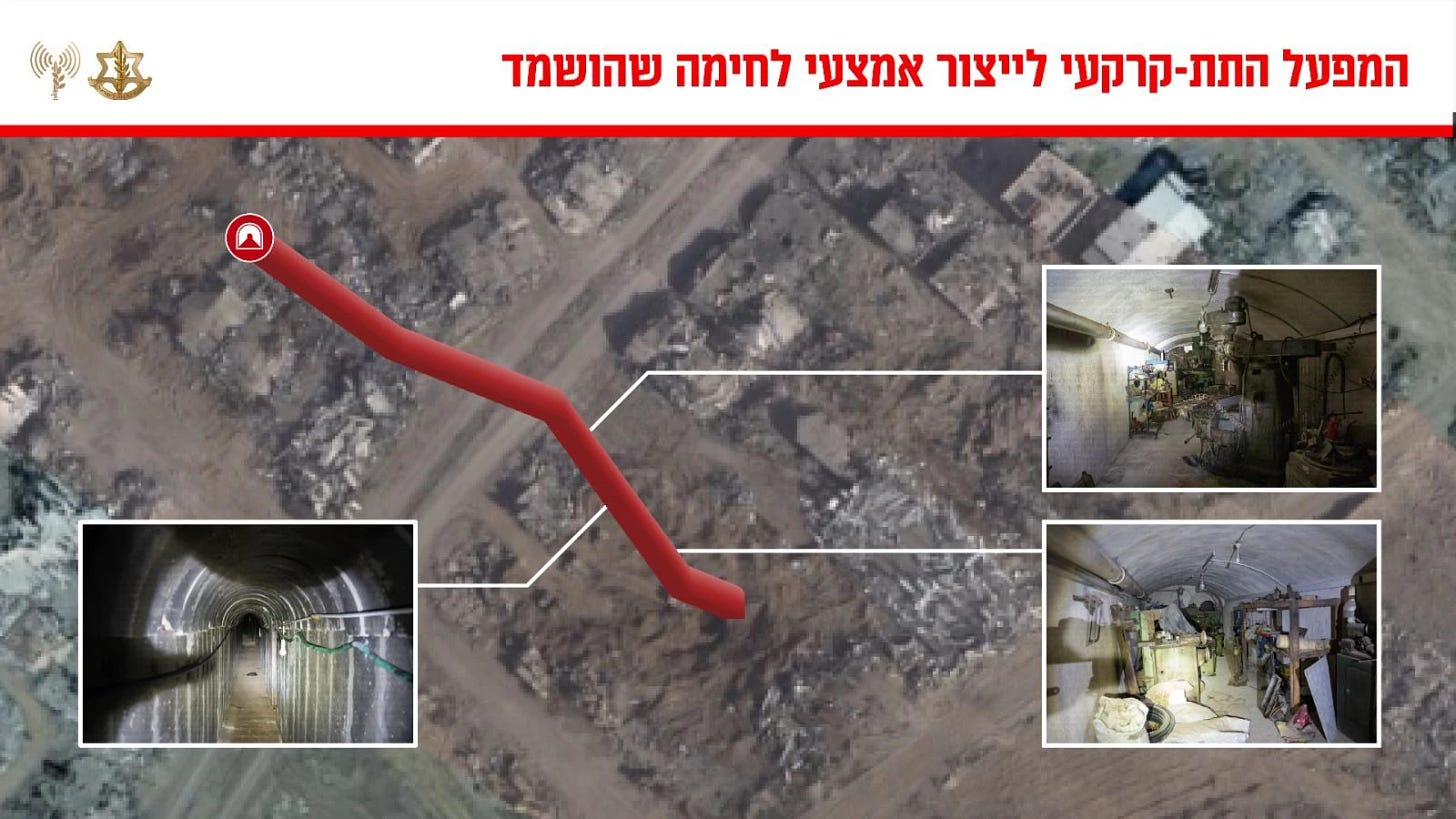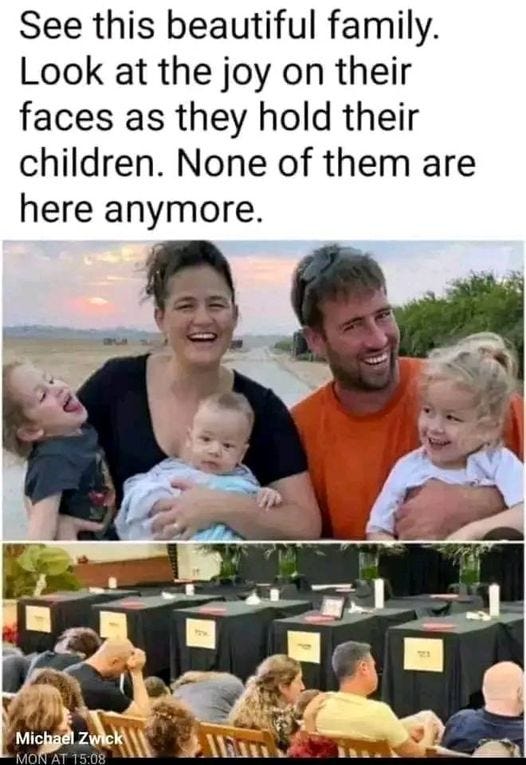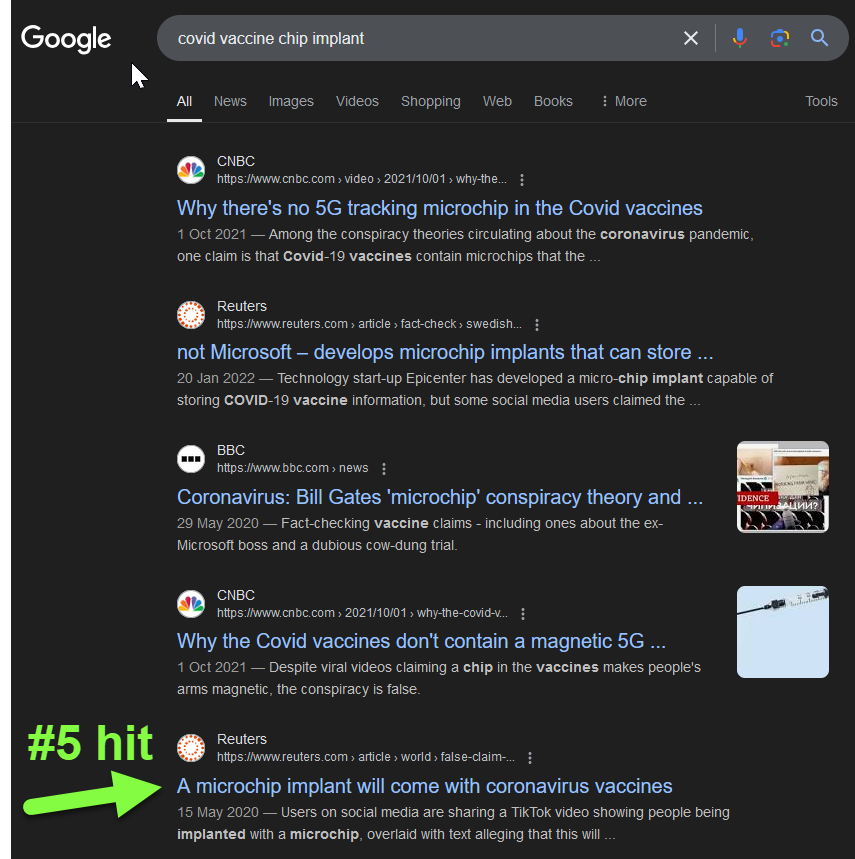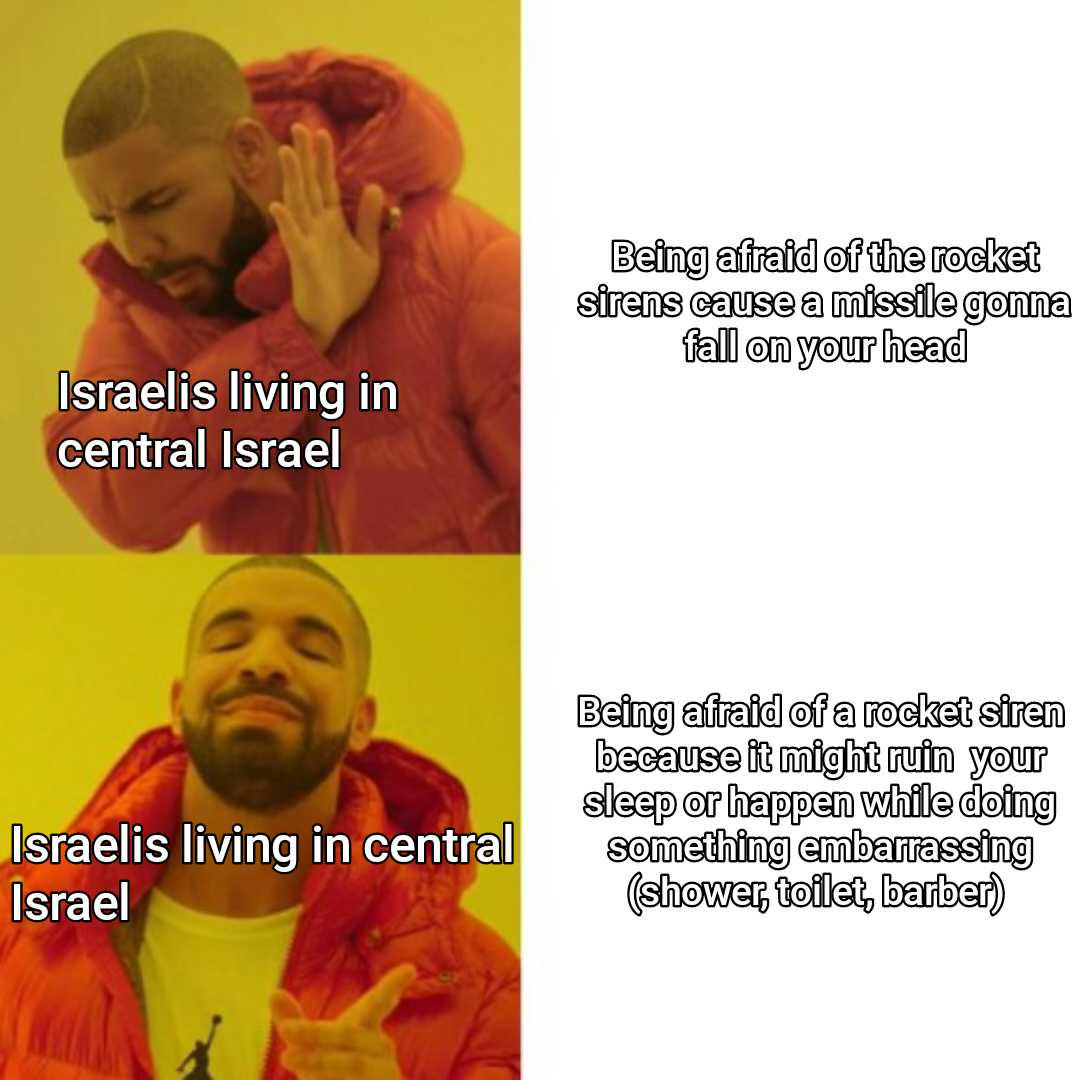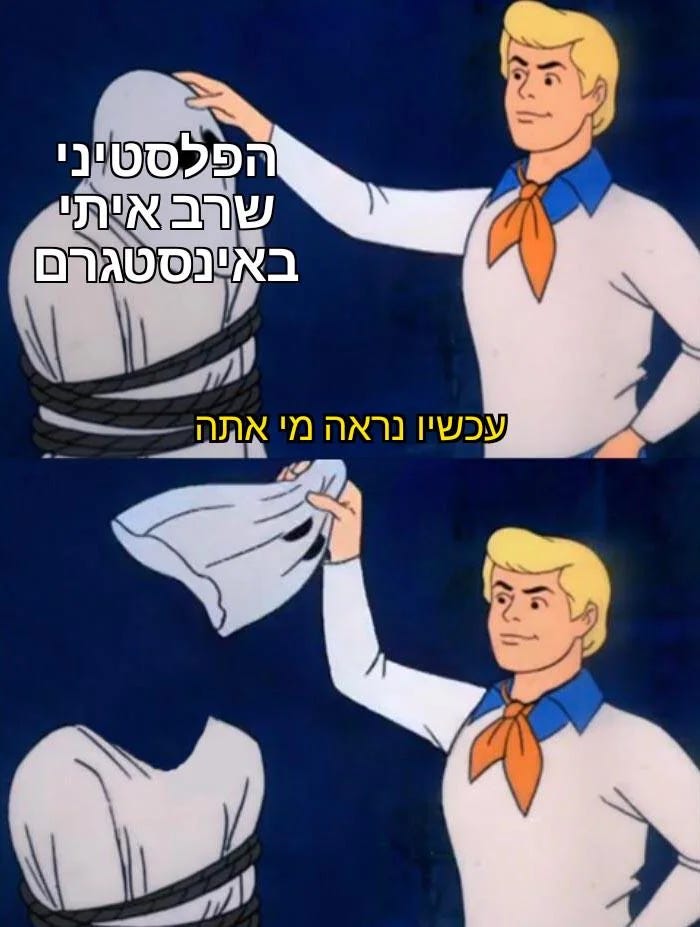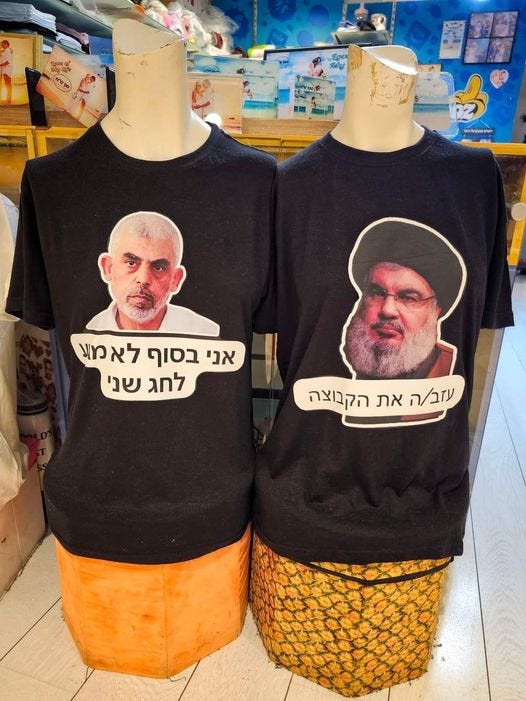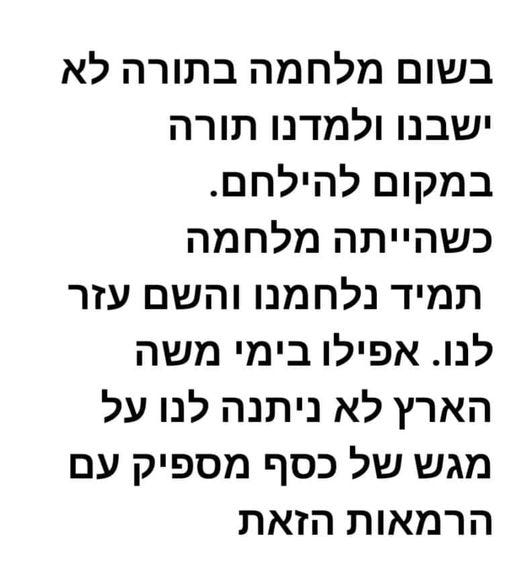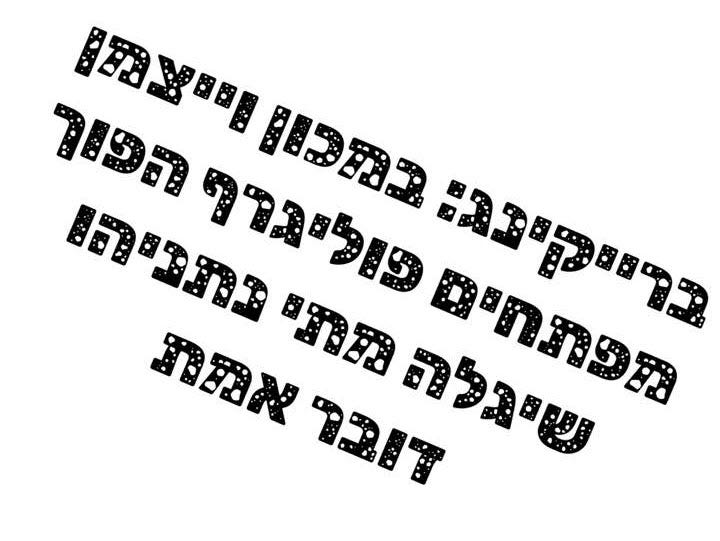First Time Here? Readers suggest starting with the expanded Gaza Explainer in #133 and #120.
Tags: 15 Min Read; Few Vids
Entry #149 received a lot of positive feedback. I am trying to suss out what makes it different than other entries. The best I can figure, so far, is that it has a high percentage of regional viewpoints presented in the first person.
Warm?
Let me know your thoughts by replying to this email or contacting me directly.
Mail
About Those Captured Hezbollah Weapons...
I said the IDF had no use for them. Well, an Israeli paper (that I do not consider reliable), Israel Hayom, says that so many anti-tank weapons have been captured that an IDF unit may be equipped with them.
So... Joke's on Raf (if the report is credible).
(And when is the last time the IDF used an anti-tank unit? Raf thinks 1973… Maybe also the first Lebanon war, in the 1980’s?)
Baalbek In The News... And In Israeli History
As there is a clip below from present-day Baalbek, and it is a prominent part of the war in Lebanon (it is a Hezbollah stronghold), here is the Baalbek story I grew up with:
Below is an excerpt from the autobiography of a cousin (first cousins of my father). Elihu King was en route to Israel in 1948, and the Jewish men on the boat were forced off at gunpoint and held prisoner in Baalbek. (I see these years of his biography have been captured on the official Machal web site.)
A PRISONER IN BAALBEK
While cruising through a now calm Mediterranean we got the news on the ship's radio that the STATE OF ISRAEL had been declared. Somehow the Arab passengers on the "Marine Carp" disappeared, maybe they moved away from where we were. Us Jews gathered in the dining hall and roared out our joy and pride. We sang "Hatikvah" and a thousand other anthems and songs, danced the hora until we dropped, cried, laughed, and carried on. The fears and doubts were kept inside, for that evening.
The crew joined us. Their union was Communist led and they were radicals all, and they were very much on our side.
Fears and doubts were not revealed. My own were devastating. Though credulous and enthusiastic I knew enough to realize that there would be a fearful armed attack on the new state, by the armies of the surrounding Arab states. I knew that the Egyptians had a large and well equipped army, and that the Transjordan Legion though small was very well armed and well trained and led by British officers of great experience. I knew that the Yishuv was lacking in organization, that only a small number of trained soldiers were available, and that the shortage of arms was an agonizing problem. How could we survive such an onslaught? The Arabs kept saying they were going to kill all the Jews, and I believed they meant it.
When I sat down and thought it through, it seemed most likely to me that we faced another holocaust. My own position was that I would not flinch, that I would go and be there and do whatever I could and if that meant going down with my people, so be it. My agonies of guilt at having been untouched by the Holocaust in Europe, and my gloomy view of where the world was going, could only be faced by such a stand.
Did I talk about this to my friends? I had no friends there, only comrades I had met in New York a week before or people I had met on the ship. Nobody I could talk with.
At the same time, I was twenty years old and had experienced almost no physical pain or fear in my life. Boys like me could not believe that we, I, myself could ever be harmed. (If we could, there would be no wars).
There was also a primary cause that I had committed myself to. Some time before all this I promised myself that I would replace Ari Lashner, an American who had been murdered by Arabs at Kibbutz Kfar Blum. Ari had been my hero and my role model, and I had pledged, privately and to myself alone, that I would go to Israel and not fill his shoes but at least put my body and my energy to service there in his honor. Now I renewed that vow.
So overall I put up a cheerful and optimistic face and prepared myself for arrival in what was now Israel, in a few days.
The captain of the "Marine Carp" (we later learned) was concerned about the well being of his Jewish passengers when the ship called in at Beirut on its way to Haifa. It was an American ship and so we were unlikely to be bothered, but still...... He contacted the US Consul General in Beirut by radiotelephone and asked for instructions. The story I heard, from good sources, is that the Consul told him that there would be no trouble, he was to bring the ship in.
At 5 in the morning we pulled into the harbor at Beirut and tied up alongside a pier. The US Consul was there to greet us. So were about 400 Lebanese Marines, in tight uniforms of blue wool - must have been awfully hot for them, when the sun came out fully. The Marines came up the gangplank and set up machine gun posts in the main corridors. An announcement was made on the loudspeakers: all Jewish passengers were to assemble in the main lounge.
We didn't do that. We bunched up in little groups throughout the ship talking and trying to work out what to do. My group crowded around Oded Bourla in the shower room next to our sleeping bay. Some of the wild ones said we should fight. Two of them had pistols. We gabbled like a bunch of geese. There were an awful lot of the Lebanese. Then another announcement on the PA system: if the Jewish men would come along and be "interned" in Lebanon, the Jewish women would be allowed to continue their voyage to Haifa unmolested. The women were under Lebanese guard while we decided. This was clearly a serious threat. Most of the women were wives of husbands on the ship; couples had been separated because of the barracks-like sleeping arrangements.
We decided to submit. The Israelis among us were fearful but they led in that decision. Us Americans felt confident we'd be repatriated in a few days at most.
The two guns were stripped down to small parts and hidden on (in, actually) the bodies of a number of the men, as was ammunition. Somebody had a compass. Each took from his bags what he thought best. And so we slowly shambled up to the main lounge. The US Consul was there, and he collected the passports of the US citizens (and, it transpired, turned them over to the Lebanese commander). Some of us passed notes to the crew, for our families. In glum, defeated dribs and drabs we went down the gangplank and climbed onto Lebanese Army trucks. The Lebanese left behind some old, sick men, but 69 of us were taken away. The Jewish women waved and called to us as the trucks drove away from the pier.
The trucks drove through the city of Beirut and out through its suburbs. Through small towns and valleys and villages we drove, until the pressure on my bladder became extreme and I pissed off the rear of my truck after getting sign-langauge permission from the Marines who guarded us. After what seemed like about four hours, the last parts climbing high into the cool hills, we arrived at Baalbek. We were taken to what had once been a French Foreign Legion barracks, a handsome building with large rooms opening out onto a long balcony on the second floor. At the head of the stairs, a washroom with a water tap, a pissing trough, and an Arab squat latrine.
In the three large barracks rooms were piles of boards of nice, soft pine. Three of these for a sleeping pallet and a thin blanket, a tin bowl and a spoon - these were issued to each of us. The guards turned out to be Palestinians, refugees. The Lebanese themselves acted frightened of us, very nervous. Some of the Palestinians were alright, some were sadistic bastards.
We were given a meal: a small cube of goats' milk cheese, a radish, a green onion, two pitas (the large flat kind, not the pocket kind). We could get water from the tap. That's what we got every day for our three meals though sometimes we each got a large spoonful of beans in tomato sauce for dinner instead of the cheese. I weighed 150 lbs when I got there, and 110 lbs when we got out six weeks later.
And so to bed, worried and fearful about what tomorrow would bring.
The morning brought the US Consul, all the way from Beirut. We all gathered together to meet with him. He told us that [we] were a real nuisance, that the Lebanese were treating us very well, and that the families of the Americans were working for our release. He heard our requests for medicine for the two of us who were down with severe measles, and agreed to get us what we needed, we could give him the money now.
We had elected some leaders from among us, and they mentioned that the last time an American citizen had been taken by force from a ship (not even a US flag ship, at that) the US Navy had a cruiser in the harbor the next day and the citizen was released under the threat of our guns. The Consul assured us that there was no danger of that happening now. The Consul showed a marked distaste for Jews; of course he was accredited to an Arab state, so that would explain it.
(It was not until the 1960s when I subpoenaed my files from the US State Department in connection with my citizenship case that I felt the reality of the discrimination. The important document about me started out thus: "This obstreperous member of a despised race.......". The US Consul in Beirut had endorsed it thus: "Right!"). So much for the Consul. When we read in the local French language newspaper that he had been on the podium at an anti Israel rally at the American University of Beirut and had seen fit to stay there while a resolution calling for our (the US prisoners) death was passed by acclamation, we were not really surprised.
The next big event for us was the Selection. (That term refers to the procedure in the concentration camps in Europe, where those who were to be killed that day were separated from the rest). We had contacts with some of the guards, who would bring us news and stuff for money, so we were prepared. The camp commander showed up with a specially big and tough retinue of guards, and called us all together. He had all our passports before him, and told us that the Israelis would be taken to a different location. We had discussed this possibility and it seemed to us that this would enable the Lebanese to kill the Israelis without risking the consequences of killing citizens of the USA or Canada. So the night before we had all - Americans, Canadians, the two with Argentinian passports, and the Israelis (who had British passports) - shaved our heads so we would not be easily identified from our passport photographs.
The first man was called forward and asked his name. "Yisrael ben Yisrael", he said, "Israel son of Israel". And so said the second shaven-headed man, and the third, and the Selection was called off.
After we'd been there for a month, and our families' efforts to get the US State Department to move on our case seemed to be stuck despite the best efforts of then-Congressman Jacob Javits of New York, we started to plan an escape. We had some Israelis among us who knew the topography pretty well, and they worked out a route to Israel (though we had no idea where the actual front line might be). We had the weapons we'd smuggled in, and accepted the fact that we would have casualties. We were tired now from poor nourishment, and dispirited from being prisoners, but we felt we had to do it.
(A few comments about being a prisoner. For me, the worst part was being so utterly helpless and not knowing what would be done to us. While it is true that I have always felt a particularly strong psychological need to control my environment I'm sure I was not alone in this distress. We were only imprisoned for six weeks but it seemed like forever and of course until the last day we had no idea if or when we might be freed. When I read of the hostages in Beirut these days, some of whom have endured over ten years of a captivity incomparably worse than mine, I feel sick and angry. That's something that might bring me to kill).
Just as we were getting ourselves ready, storing food at the expense of eating it and so on, we got some hints that we might be released. Then the US Consul came to visit. The Lebanese offered to release us and let us go back to the USA, providing we would each swear never to attempt to go to Israel. That included the Israelis. We agreed. An oath under duress is okay.
Then we waited some more.
One morning, the Lebanese Army trucks came grinding into the courtyard. We needed no further notice, put our belongings into our pockets and lined up with the weakest and sick ones at the head of the line....just in case. But no, they took us all. Huddled together in heaps at the bottom of the truck, we were too weak to sit upright and too scared that it might not be for real to sing or joke around. But yes, they took us to the pier, and there was the same "Marine Carp", this time on its way back to the USA on another round trip.
Weakly, still very fearful that the ordeal was not really over, we climbed up the gangplank. Crew members helped us on board and down to the sleeping bay and up onto the bunks. Later they gave us a festive meal of turkey and all the trimmings, ice cream, the lot. We gorged ourselves and soon returned the goodies, which our shrunken and tender tummies refused to hold.
Dept of The Invisible
Items invisible in the Western media.
Batroun, Lebanon
No one was killed, and no buildings were damaged. So... not in the Western news?
Israeli special forces captured a senior Hezbollah operative at 3 AM this past Friday night. Lebanese social media is full of security camera footage of the guy being led away. At first, Hezbollah (and the Lebanese government, probably under Hezbollah pressure) said he was an uninvolved civilian. (Creates a bit of a problem... do we believe the Lebanese public posture or the Mossad? [Who wouldn't have sent soldiers into danger for no reason.])
A couple days later, this:
Lebanese media publish what was found in the apartment of Emad Amhaz, who was kidnapped by Israeli special forces from the Batroun area in Lebanon:
About ten SIM cards for a mobile phones (including foreign SIMs), as well as several passports.
He is a senior Hezbollah operative involved with the smuggling of weapons into Lebanon.
Baalbek, Lebanon: Baalbek has become a ghost town
One of the opponents of Hezbollah mocks the residents of Baalbek who fled the city following the warning of the IDF spokesman in Arabic:
They tell you to leave and you leave...
Don't say later that you won and "stood firmly" - these are empty slogans, you ran away and left Baalbek to the thieves.
Lebanon: Looks Like ____ ?
The below clip, 45 seconds long, is the view of the war in Lebanon from the perspective of an Israeli soldier:
Postmark
Tehran: Iran's Supreme Leader tweets in Hebrew:
"The US and the Zionist regime will receive a decisive response to what they're doing against Iran and the Axis of Resistance."
Now Iran implicates the US?
(Note the recent stationing on U.S. bombers in the region... Sounds like Washington has reason to be concerned.)
Elsewhere in Tehran... Iran Hijab Protest 2024
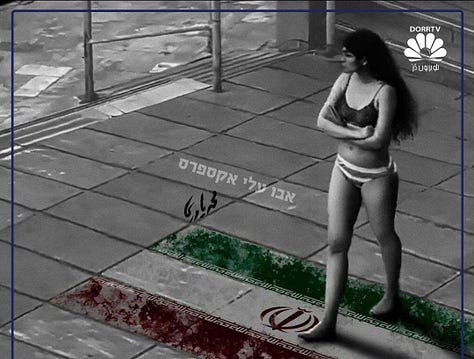
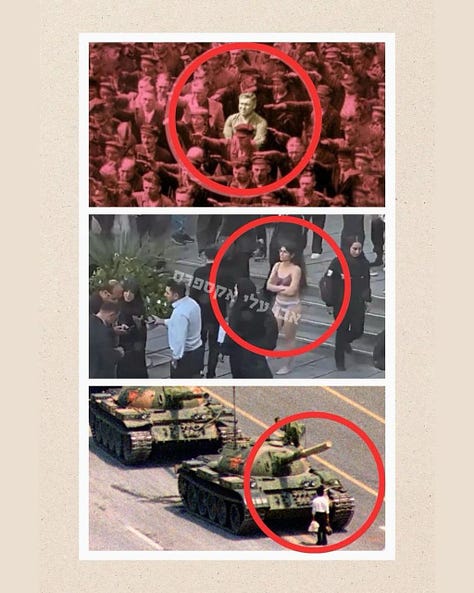
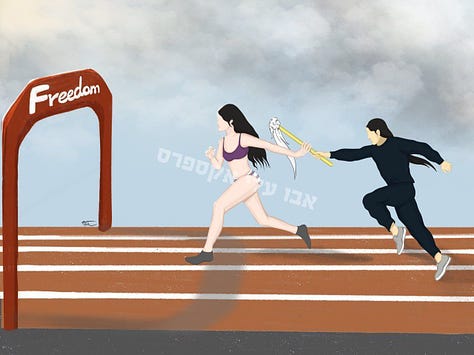
A story that is gaining momentum in the last day on social networks - an Iranian student from Azad University in Tehran was filmed walking in underwear and a bra outside the university's campus.
According to student sources in Iran, she did not wear a hijab as required and a confrontation developed between her and "those responsible for morality" at the university.
According to some versions her clothes were torn off her and according to other versions she removed her clothes as an act of protest.
Her name was not released and she was taken "to an unknown location."
Supporters of the Iranian opposition are framing her as a continuation of Mahsa Amini, the young Kurdish woman whose death about two years ago ignited widespread riots against the regime.
A day or two later:
Sources associated with the Iranian opposition: The Iranian student who was attacked by the "Morality Guards" at the entrance to the "Azad" ("Freedom") University and was photographed without her clothes, was arrested and taken to a psychiatric hospital for "tests and treatment".
Like the bad days in the Soviet Union...
Social Media
An effect of openly supporting Israel.
I can relate to this. There are all kinds of things I have stopped sharing. It isn’t about being judged. It is clear that the folks protesting the war, involved in BDS and Jewish Voice for Peace do not understand how close they are to Iranian intelligence services.
Gaza
Packets of Karelia cigarettes are smuggled inside humanitarian aid flour sacks.
On the sacks is written: "NOT FOR SALE". (The joke being that these cigarettes have enormous street value and are part of a commercial smuggling enterprise sneaking into the humanitarian aid channel.)
Humanitarian aid is getting to the Gaza Strip!
Peace through nicotine: It reduces incentives to smuggle; Makes friends among the population (print the boxes with messages for peace, against Hamas… even quotes from the Koran promoting non violence); and, Raises funds to support the Hamas alternative government. Count the wins!
Central Gaza: Advanced Machine Shop in a Tunnel
We are a year into the war, and tunnels are still being discovered. In this case, an entire ammunition factory, with machine shop and CNC tools.
First exploration of the tunnel after an entry is dug in the middle of it.
Tour of the machine shop--drill presses, milling machines, lathes and more:
I don't like saying this, but discoveries like this make a strong case for continuing the war in Gaza. I have never heard any calls for "ceasefire" that include demolition of all the tunnels or Hamas disarmament. (Note, Israel might, for many reasons, decide that it wants to cease combat--human cost, financial cost, other priorities--but finds like this one support the case that even in the event of a ceasefire that work against tunnels continue. E.g. Stop shooting yet continue digging.)
Bookmark to Elihu King
The piece about Baalbek above recounts Eli's life at age 20. Here are a few words by Zohar Shohat, 17, from Safed (Tzfat). (Zohar's full essay is here.)
In September, there was a serious escalation in the north, and everything became more intense. There have been missile launches, sirens and interceptions several times a day, allowing just 30 seconds to get safely to a shelter. As a result, people in Safed don't really go out much these days. Before, it was occasional and it didn’t feel real. You’d think, "It won’t happen to me.” But then the explosions started getting closer and the blasts became more intense. You can really feel the change. There have also been many sirens at night, so sometimes it’s hard to fall asleep because you tell yourself, “I’ll stay awake and wait for the siren rather than be woken up in the middle of my sleep,” but it can go on like that until 5 AM.
Right now, I feel the most fear I’ve felt since the beginning of the war. October 7th felt distant to me: An infiltration by terrorists… it didn’t feel real. We thought it would end in a few days, and the idea of a war with Lebanon seemed absurd, unimaginable. Today, it feels like everyone has lost their direction, and no one has any idea what will happen next. We’ve now marked a year since the war began and things are only escalating, and expanding to more fronts. So it’s very hard to imagine the end and what the day after will look like.
…
A New Sense of Purpose Next year, I’m planning to do a year of service abroad through the Jewish Agency. This has been a dream of mine for a long time, and now it feels more relevant than ever.
As for military service, I feel a change in those around me. Before the war, some wanted to avoid it or just do a desk job at the nearest army base. Now, with the war so real and frightening, you’d expect people to be more afraid and even less willing to take on serious and dangerous roles. But the opposite is true. Everyone I know is now more determined than ever to serve in combat roles and find the most meaningful positions they can. People really want to do their part.
This is why:
They were murdered on October 7.
Relief Area
I have been thinking about how is that, in 2024, anyone talks about microchips in vaccines. Wasn’t that a passing thing during the pandemic? Then I remembered... Russia is either an originator or amplifier of whacked, anti-scientific-progress conspiracy noise, including 5G paranoia and “chips in vaccines.”
Sure enough, note that one of the hits below is from rt.com.
The clip from Iranian television in #149 is no whackier than a U.S. member of congress ranting about Space Lasers
Alef
("Central Israel" is Tel Aviv, Herzlia, Rishon LeTzion, etc.)
Bet
The Palestinians who fought with me on Instagram…
Now we will see who they are…
(poof… cause they are cut outs, mostly not real people)
Gimmel
The shirt with Nasralla reads "Left the group" (what it says in Whatsapp when someone leaves a chat group)
The shirt with Sinwar reads "In the end, I'm not coming back for the end of the holiday."
Dalet - Seen on FaceBook
In the Torah in no war did we sit and learn Torah instead of fighting. When we had to make war we fought and G-d helped us.
Even in the days of Moses the land was not given to us on a silver platter -- enough of this cheating!
(Referring to ultra religious, Haredim, avoiding military service. Their usual line is, “Studying Torah is how we fight/support the nation.” On a recent TV interview, I heard Haredim say "We don't need a country, so why should we serve in its army? You, whose parents and grandparents fought to found the country, you should fight, not us.")
Hey
Breaking News: The Weizmann Institute is developing a Reverse Polygraph that will indicate when Netanyahu is telling the truth.
This past weekend, Adina threw a party to celebrate two years of Raf in Israel. A friend said that it’s been like two dog years: The first year was protests over the changes to the judicial system. The second year more or less started October 7.
It took two years to get to today: I had lunch with a software engineer today. He started coding in my old office when he was in high school, in the ShipRush era. Now he works on the guts of Microsoft Azure at the Microsoft campus in Herzliya.
The cafe there is excellent!
To Peace,
Raf
(Thank you A.K., M.T., M.R., R.G.)



